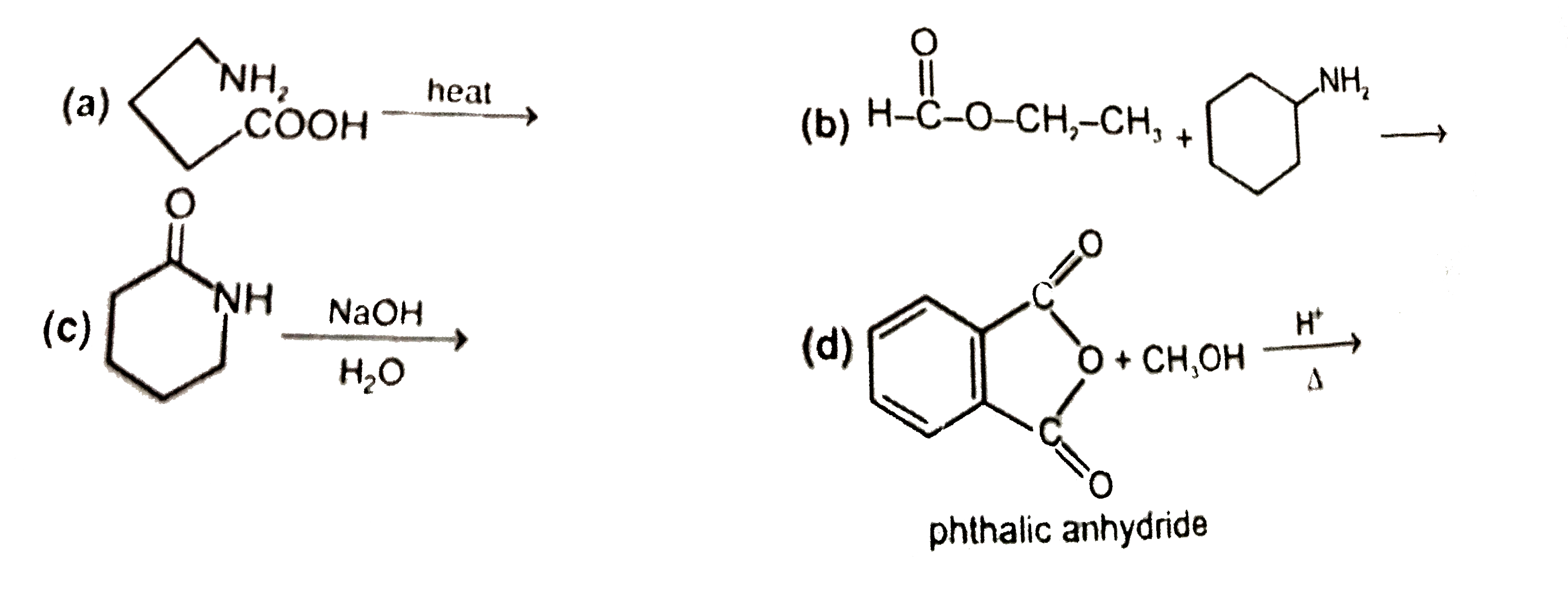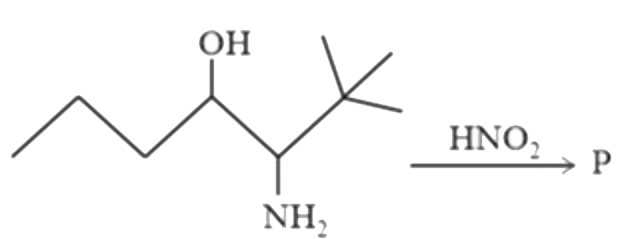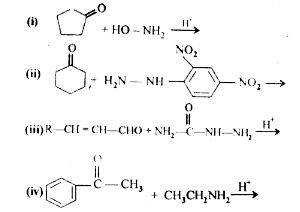Predict the nature of P in the following reaction : Me3CCH2NH2HONO−−−→P(main product)
Me3CCH2OH
Me2CCH=CH2
Me2CO(OH)C2H5
Me3CCH2NH(NO)
The correct Answer is:C
To predict the nature of P in the reaction of Me₃CCH₂NH₂ with HONO, we can follow these steps:
Step 1: Identify the Reactants
The reactant is Me₃CCH₂NH₂, which is a tertiary amine. The structure can be drawn as follows:
- The central carbon (C) is bonded to three methyl groups (Me) and one CH₂NH₂ group.
Step 2: Understand the Role of HONO
HONO (nitrous acid) can decompose to produce nitrosonium ion (NO⁺), which acts as an electrophile. This electrophile will attack the nitrogen atom in the amine group.
Step 3: Electrophilic Attack
The nitrosonium ion (NO⁺) will attack the nitrogen atom of the amine (NH₂) group. This results in the formation of a positively charged intermediate:
- The nitrogen atom will have four bonds (three to hydrogen and one to the nitrosonium ion), resulting in a positive charge on nitrogen.
Step 4: Formation of Carbocation
As the reaction proceeds, the bond between the nitrogen and the carbon (C) will break, leading to the formation of a carbocation:
- The carbocation will be formed on the carbon adjacent to the nitrogen, which is a secondary carbocation.
Step 5: Methyl Shift
The secondary carbocation is not very stable, so a 1,2-methyl shift occurs. This means that one of the methyl groups from the carbon adjacent to the carbocation will shift to stabilize the carbocation:
- The structure now has a more stable tertiary carbocation.
Step 6: Nucleophilic Attack by Water
Water can then attack the carbocation, leading to the formation of an alcohol:
- The final product will have an OH group replacing the NH₂ group.
Step 7: Final Product Structure
The final product P can be represented as:
- Me₂C(OH)CH₂CH₃, which is a tertiary alcohol.
Conclusion
The nature of P is a tertiary alcohol resulting from the reaction of Me₃CCH₂NH₂ with HONO.
---
The reactant is Me₃CCH₂NH₂, which is a tertiary amine. The structure can be drawn as follows:
- The central carbon (C) is bonded to three methyl groups (Me) and one CH₂NH₂ group.
HONO (nitrous acid) can decompose to produce nitrosonium ion (NO⁺), which acts as an electrophile. This electrophile will attack the nitrogen atom in the amine group.
The nitrosonium ion (NO⁺) will attack the nitrogen atom of the amine (NH₂) group. This results in the formation of a positively charged intermediate:
- The nitrogen atom will have four bonds (three to hydrogen and one to the nitrosonium ion), resulting in a positive charge on nitrogen.
As the reaction proceeds, the bond between the nitrogen and the carbon (C) will break, leading to the formation of a carbocation:
- The carbocation will be formed on the carbon adjacent to the nitrogen, which is a secondary carbocation.
The secondary carbocation is not very stable, so a 1,2-methyl shift occurs. This means that one of the methyl groups from the carbon adjacent to the carbocation will shift to stabilize the carbocation:
- The structure now has a more stable tertiary carbocation.
Water can then attack the carbocation, leading to the formation of an alcohol:
- The final product will have an OH group replacing the NH₂ group.
The final product P can be represented as:
- Me₂C(OH)CH₂CH₃, which is a tertiary alcohol.
The nature of P is a tertiary alcohol resulting from the reaction of Me₃CCH₂NH₂ with HONO.
Similar Questions
Knowledge Check
- Question 1 - Select One
Predict the product (A) of the following reaction
 A
A B
B C
C D
D
Predict the products of the following reactions.
 View Solution
View SolutionPredict the product of the following reaction :
 View Solution
View SolutionThe product (P) of the following reaction is:
 View Solution
View SolutionThe product (P) of the following reaction is:
 View Solution
View SolutionComplete the following reaction: (NH4)2CO3Δ−−→
View SolutionComplete the following reactions :
2CH3COOHP2O5−−→View SolutionComplete and balance the following reactions :
NH3+O2Pt−−→View Solution


